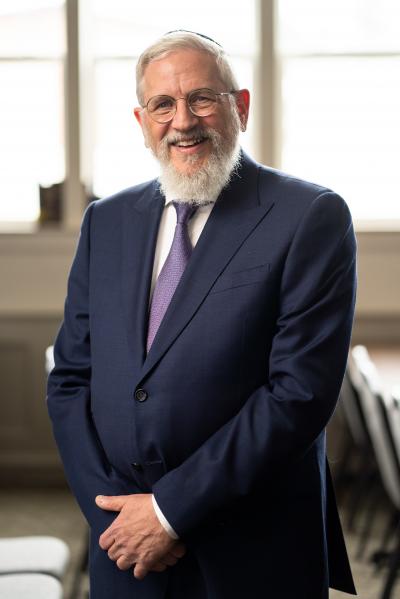The days between Pesach and Shavuos have been compared to the period from אירוסין — 'betrothal' to נשואין — 'marriage'. We were selected as the bride of G-d on Pesach and stood beneath the Chuppah at Mount Sinai on Shavuos.
We count the forty-nine days of Sefirah to prepare ourselves anew as a worthy bride ready to assume her relationship with G-d and its associated responsibilities.
Coincidentally, by neither of these mitzvos — marriage and counting the Omer, do we recite a blessing of Shehecheyanu as we do when performing other mitzvos that come from time to time.
Rav Yosher Ber Soloveitchik, famed 'Rav' of Boston and Rosh HaYeshiva of Yeshivas Rabbeinu Yitzchak Elchonon, suggests a fascinating idea to explain why when counting the Omer we omit this blessing.
The Sefer HaChinuch asserts that the reason we count these forty-nine days is to show how much we long and yearn for the day when the Torah was given. The sole purpose for leaving Egypt was so that we 'will serve G-d on 'this' mountain'.
If this be the case then we should really countdown from the day we left Egypt, not from the second day of Pesach. However, since G-d desired for us to first relish with joy our newfound freedom, He did not want to hamper that joy with a pained emotion of longing for the day of the giving of the Torah, so we start on the next day.
It is for this reason we cannot utter the blessing that expresses our joy to the One, 'Who has kept us alive, sustained us, and brought us to this season'. Our joy is deficient as we have not yet reached our craved for goal just yet.
The Akeidas Yitzchok indeed writes this blessing was not instituted for this mitzvah of counting the Omer precisely because it was too premature to rejoice while we are in 'pain' over not having 'arrived' just yet.
The Prophet Hoshea conveys the words of G-d who promises His beloved nation, וארשתיך לי — And I will betroth you to me, לעולם — forever.
Betrothal is only the first stage of marriage where the bride is duly wedded but not able to be intimate with her groom. It is only after נשואין — marriage under the chuppah, that one reaches the stage where they may live as man and wife and may experience the heightened joy that comes with a future together.
Why then does G-d only refer to his bride — the Jewish nation, as his incomplete betrothed, and not his fully wedded wife?
We read this week the famous mandate קדושים תהיו — You shall be holy.
The Ramban teaches that this directs one, קדש עצמך במותר לך — to sanctify yourself in that which is permitted to you.
The traditional understanding of this is to sanctify ourselves through refraining from even those activities that are not specifically restricted by the Torah but nevertheless are worthy of restraint. Whether it is regarding the levels of indulgence in our relationship to food, intimacy, or manner of speech, one who sanctifies that which is otherwise permitted to him, embodies the objective of this command.
Is this merely encouraging us to go beyond the letter of the law and restrict otherwise permitted activities?
The Holy Shelah explains it is so much more than that.
The six hundred and thirteen mitzvos are merely a baseline, outlining the general parameters of G-d's expectations from us. But we are each different with varying capabilities and challenges. Each one of us is expected to expand the boundaries of our obligations in including areas not specifically instructed, to figure out each one's unique obligation.
In a sense it is a never-ending quest to raise the bar of our commitments, with yesterday's maximum, tomorrow's minimum starting point on which to expand it ever further.
That which is in our reach and ability becomes our personal obligation.
We must forever long to include more areas of devotion to G-d, which is eternal as the Torah is, until such time as we complete our mission on earth meriting the full blown experience of closeness to G-d in the World to Come.
G-d refers to our relationship as betrothal because in that stage there is something that is greater and missing from the complete relationship of marriage — longing.
In this sojourn on earth facing the challenges that will lead us to perfection, there must be constant longing to expand our connection to G-d.
Rav Avigdor Neventzal, the Chief Rabbi of the Old City, says that in marriage as well, one must always aspire to discover new appreciation and joy in the relationship and one's spouse, always longing for deeper and more meaningful joy.
Perhaps that is why at a marriage we omit the Shehechyanu as well, as it is yet incomplete as one continues to long for greater discovery in the depths of the other's qualities.
The Holy Alshich teaches that the forty-nine days of Sefirah culminating with the fiftieth day of Shavuos, corresponds to the natural lifespan of man, which is seventy years, discounting the first twenty years where man is not held accountable for heavenly retribution, thus a total of forty-nine years culminating with his reaching the pinnacle of life at seventy.
That pining for the day of the giving of Torah must find its expression each day of our lives in a constant pursuit of 'raising the bar'!
באהבה,
צבי יהודה טייכמאן



















